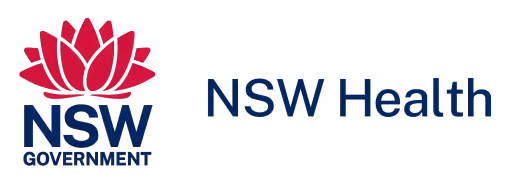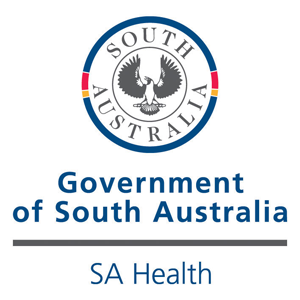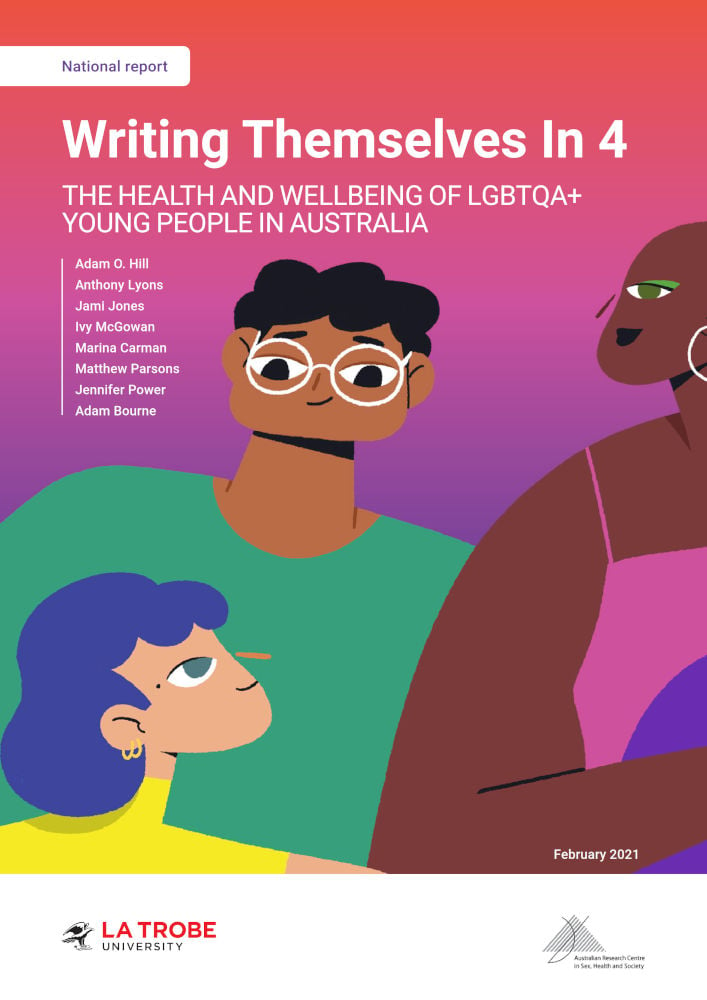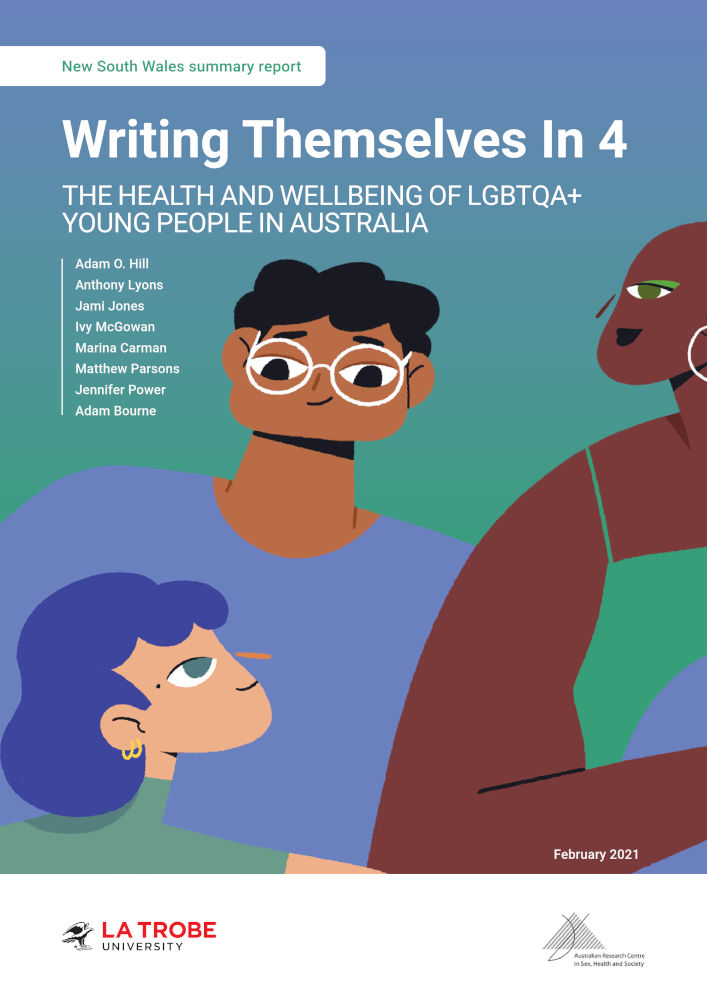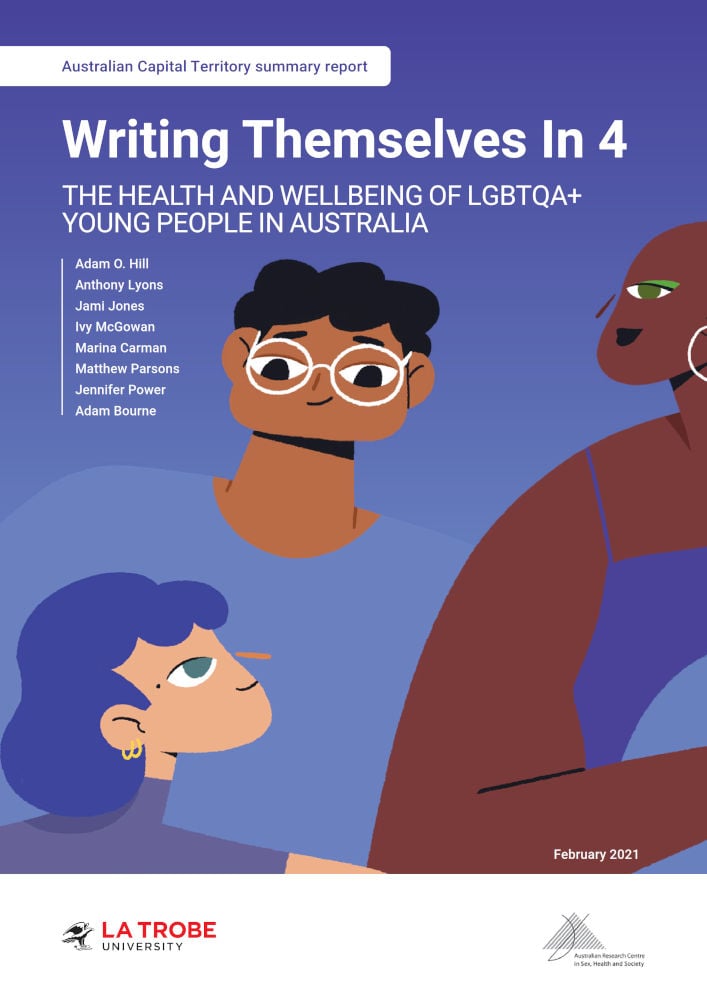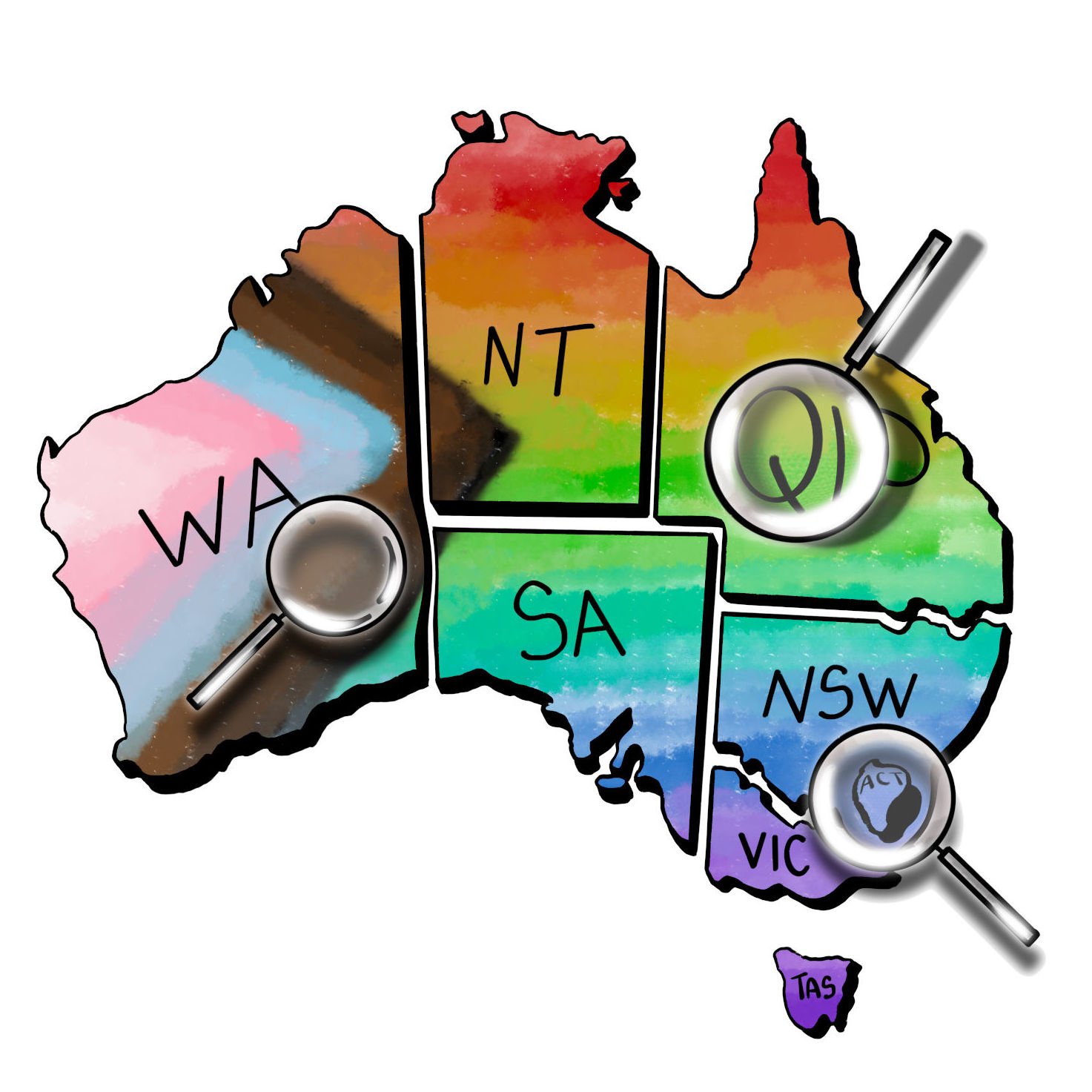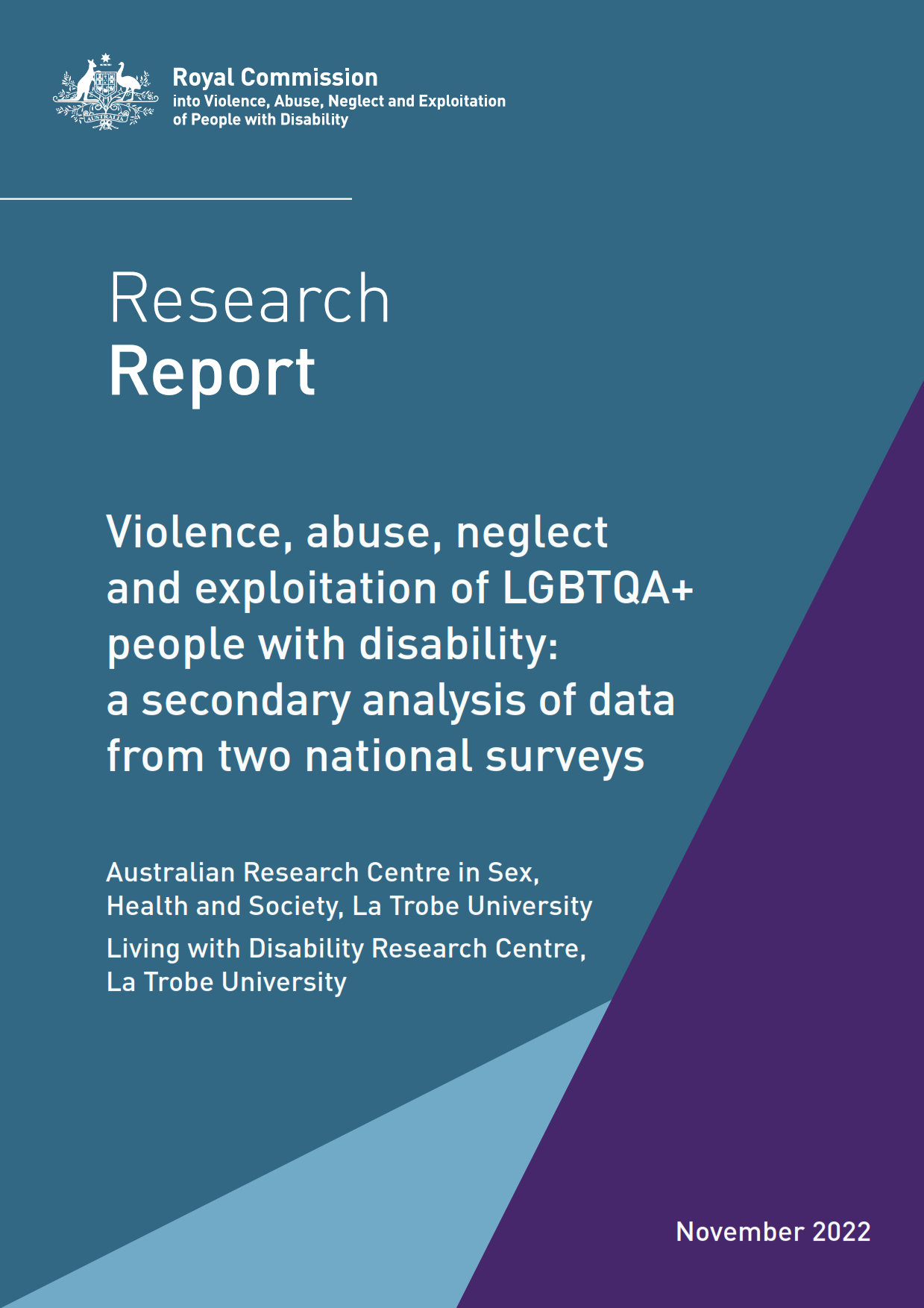Writing Themselves In 4

The health and wellbeing of LGBTQA+ young people in Australia
2020-2021
Adam O. Hill, Anthony Lyons, Jami Jones, Ivy McGowan, Marina Carman, Matthew Parsons, Jennifer Power, Adam Bourne
In 2019, the Australian Research Centre in Sex, Health and Society (ARCSHS) at La Trobe University, with support from Rainbow Health Australia and Rainbow Network, asked 6,418 LGBTQA+ people aged 14 to 21 about their experiences with education, homelessness, harassment, assault, mental health, community connections and more. This is the largest ever study on the experiences of LGBTQA+ young people aged 14-21 in Australia.
The national report includes these findings and recommendations.
Download the Writing Themselves In 4 National Report (PDF, 9MB)
Summary reports
These reports summarise key findings from Writing Themselves In 4 that are specific to the participants who were residents in the Australian Capital Territory (ACT), New South Wales (NSW), South Australia (SA) and Victoria (VIC) at the time of completion. They are designed to complement the national report by providing data relating to specific topics broken down at the state/territory level. These reports cover issues that can at times represent challenges for LGBTIQA+ young people (such as mental health, discrimination or abuse) as well as aspects of life that can enhance health and wellbeing (such as supportive relationships and community engagement).
Writing Themselves In: New South Wales summary report (PDF, 5MB)
Writing Themselves In: South Australian summary report (PDF, 5MB)
Writing Themselves In: Victorian summary report (PDF, 5MB)
Writing Themselves In: Australian Capital Territory summary report (PDF, 5MB)
For access to these reports in an alternative format, please contact arcshs@latrobe.edu.au
Additional analyses and outputs
LGBTQA+ mental health and suicidality briefing papers
Drawing from Writing Themselves In 4, as well as Private Lives 3 and Pride and Pandemic, these reports document the rates and associations of mental health and suicidality for LGBTQA+ community members at the State and Territory level in Australia. Across eight individual reports, analyses focus on State- and Territory-level rates of suicidality, mental ill-health, healthcare service access and modalities, risk factors such as discrimination and harassment experiences, and protective factors such as community- and school-based belonging. Each report also documents the association between these factors and levels of suicidality within each State and Territory in Australia.
To establish a broader context for these results, each report also provides comparative estimates between (a) the State or Territory results with general population estimates in Australia from the Australian Bureau of Statistics, and (b) a comparison between States and Territories (broadly) from the available data. Lastly, these reports also provide an assessment of each State or Territory's current policy and programming context (along with an assessment at the Primary Health Network level) to establish ways of furthering policy and health reform at the State and Territory level.
Rainbow Realities
The Rainbow Realities report was commissioned by the Commonwealth Department of Health and Aged Care to inform development of the 10-year LGBTIQA+ Health and Wellbeing Action Plan. Rainbow Realities provides a synthesis of pre-existing findings as well as more than 50 new analyses derived from the data of six surveys of LGBTQA+ populations in Australia, including Writing Themselves In 4, as well as Private Lives 3, SWASH, Trans Pathways, Walkern Katatdjin (Rainbow Knowledge) and Pride and Pandemic.
The report has been thematically organised into 10 chapters relating to either a key determinant or contributing factor to LGBTQA+ health outcomes, or a topic of particular interest: Mental health and suicidality; income inequality; housing and experiences of homelessness; discrimination and abuse; family violence and sexual assault; alcohol and other drugs; relationships; parenting and sexual and reproductive health; gender affirmation and trans affirming practices; general healthcare; Aboriginal and Torres Strait Islander people and intersectional identities.
Violence, abuse, neglect and exploitation of LGBTQA+ people with disability: a secondary analysis of data from two national surveys
This report was compiled to inform the Royal Commission into Violence, Abuse, Neglect and Exploitation of People with Disability. It presents data on the experiences of lesbian, gay, bisexual, trans and gender diverse, queer and asexual (LGBTQA+) people with disability in Australia from Writing Themselves In 4, as well as Private Lives 3.
The report covers a wide range of experiences and issues of concern for LGBTQA+ people with disability. This includes: disclosure of sexuality or gender identity to others, and feelings of acceptance or support when doing so; feelings of safety (or otherwise) at work, in educational contexts and in LGBTQA+-specific spaces; experiences of harassment, abuse and discrimination; family and intimate partner violence; mental health or experiences of suicidal ideation or attempt; and feelings of connection to communities of people living with disability and/or those who are LGBTQA+.
Journal articles
The Writing Themselves In 4 research team is currently preparing a range of journal articles that focus in on specific issues in more detail. These will be added to this webpage as they are published online. If you are not able to access them via the links below, please contact arcshs@latrobe.edu.au
- Mental health and wellbeing outcomes associated with social, medical, and legal gender affirmation among trans young people in Australia
This study examined the correlations between different types of gender affirmation - medical, legal and social - and various health and wellbeing outcomes among trans young people in Australia. - Psychological distress mediates the link between bullying and truancy in Australian LGBQ+ adolescents with experiences of homelessness
Homeless LGBQ+ youth were found to face high levels of bullying at school, which leads to increased distress and higher truancy rates. This study suggests that addressing bullying and supporting these youth are crucial for helping them stay engaged in their education and reducing the risk of future homelessness. - Affirmation, friendship, and volunteerism: Understanding and facilitating what makes LGBTQA+ young people feel good about themselves
This qualitative study analysed the open-text responses of 4751 young people in response to the question 'What makes you feel good about yourself?’ The findings suggest the importance of ensuring access to mental health services and social/support programs while also acknowledging young people’s agency and the significance of everyday, informal acts which support them to achieve desires for connection, acceptance, contribution, belonging and self-expression. - Demographic predictors of experiences of homelessness among lesbian, gay, bisexual, trans, gender-diverse and queer-identifying (LGBTIQ) young people in Australia
This study identified factors associated with both lifetime and recent experiences of homelessness among LGBTQA+ youth. Analyses also found associations between recent experiences of homelessness and experiences of harassment, alcohol consumption, and psychological distress. - Factors Associated With Experiences of Harassment or Abuse Among Lesbian, Gay, Bisexual, Trans, Queer, and Asexual Young People With Disability in Australia
A large proportion of this sample of LGBTQA+ young people with disability reported experiences of verbal, physical, and sexual abuse based on their sexual orientation or gender identity in the past 12 months. The study explores factors associated with these experiences and highlights an urgent need for preventing and addressing experiences of abuse in this population. - Affirming educational and workplace settings are associated with positive mental health and happiness outcomes for LGBTQA+ youth in Australia
LGBTQA+ young people who report being a part of an affirming educational institution or workplace experience, not only lower psychological distress, but also greater subjective happiness. These findings were true for both cisgender sexual minority and trans and gender diverse young people. - Demographic Predictors of Experiences of Homelessness among Lesbian, Gay, Bisexual, Trans, Gender-Diverse and Queer-Identifying (LGBTIQ) Young People in Australia
Experiencing homelessness was associated with higher levels of alcohol consumption and higher prevalence of experiencing verbal, physical and sexual harassment, but only modestly associated with higher levels of psychological distress. Homelessness risk and burden is unevenly distributed among LGBTQ+ youth and is linked to outcomes which may potentiate future homelessness. - Religious Conversion Practices and LGBTQA + Youth
This paper examines how the experience of conversion practices aimed at changing a young person’s sexuality or gender identity is associated with poor mental health outcomes, providing evidence in support of legislation that bans these practices. - Suicidal ideation and suicide attempt among lesbian, gay, bisexual, pansexual, queer and asexual youth
This paper examines the factors and forces that shape the experience of suicidal ideation and suicide attempt among this group of young people within the Writing Themselves In 4 sample. It describes how verbal, physical and/or sexual harassment or assault are strongly associated with an increased likelihood of suicidal ideation or attempt. The paper also demonstrates how those from a religious family or household, and those living in regional or rural areas were more likely to have this experience. - Illicit drug use among lesbian, gay, bisexual, pansexual, trans and gender diverse, queer and asexual young people in Australia: intersections and associated outcomes.
This paper examines the patterns of illicit drug use among LGBTQA+ young people, including who might be most likely to perceive their own use as problematic.
Key figures slide set
Animated video
In this animation video, members of the study’s Youth Advisory Committee members share what the findings mean to them.
Replay the launch webinar
The launch event features two keynote presentations. First from the study's lead researcher Associate Professor Adam Bourne to present the key findings. The second is from co-author Marina Carman, Director of Rainbow Health Australia.
This is then followed by a panel discussion from co-author Associate Professor Jen Power. Thank you to our panelists Rory Blundell, Oliver Keane, Jasmine Phillips, Deb Tsorbaris and Tim Bavinton.
Highlights from the media
- "Coming out is getting easier for LGBTQA+ youth, but not for everyone" an article from ABC News Online
- "National survey finds safety and affirmation essential fundamental needs for LGBTQA+ young people" an article from ABC News Online
- "Tips for looking for roommates as an LGBTQI+ person" an article from ABC Everyday interviewing lead investigator Associate Professor Adam Bourne on the study findings and community board advisor Starlady
- Well Well Well on JOYFM a podcast interviewing in depth the lead investigator Associate Professor Adam Bourne
- Queer View Mirror on RRRFM a podcast interviewing two young trans and queer advocates and the lead investigator Associate Professor Adam Bourne discussing the findings of Writing Themselves In 4.
- "Over 80 percent of LGBTQA+ young people experience high levels of psychological distress, new aussie survey finds Mental health crisis among young LGBTQA Australians" an article from MTV News Australia
Funding
Writing Themselves In 4 received generous support from:
- The Victorian Department of Premier and Cabinet
- The Australian Capital Territory Government Office for LGBTIQ+ Affairs
- The New South Wales Department of Health
- SHINE SA, with support from the Office of the Chief Psychiatrist in South Australia.


